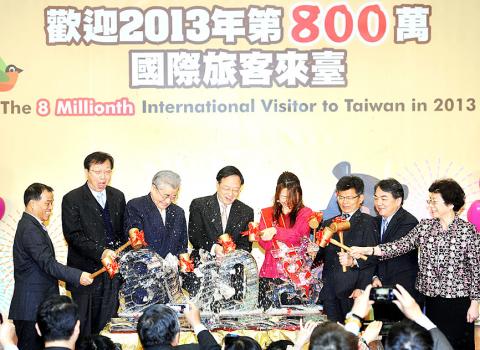Premier Jiang Yi-huah (江宜樺) yesterday proposed a blueprint to turn Taiwan into a “tertiary industry-based country” that can attract more than 10 million international tourists a year over the next decade.
“Where there is the will, we can make it,” Jiang said, citing a recent policy revision that he said helped bring the annual foreign visitor number to a record 8 million on the last day of last year.
Jiang was referring to the increase in the daily quota for free independent Chinese travelers from 2,000 to 3,000 that began on Dec. 1 last year.

Photo: CNA
A National Immigration Agency official said that Jiang had decided to raise the quota at meeting in November last year, during which officials estimated arrivals of foreign visitors for last year could fall about 100,000 short of 8 million.
The Executive Yuan yesterday held a reception for Aya Omote of Japan, who arrived in Taipei on Sunday with her husband for their honeymoon and was identified as the nation’s 8 millionth international visitor last year.
The couple were given NT$500,000 worth of gifts from local businesses, including several round-trip air tickets between Taiwan and Japan, hotel accommodation, a tablet computer and souvenirs.
According to the Tourism Bureau, China, Japan, and Hong Kong and Macau ranked as the three largest sources of overseas arrivals, accounting for 36.5 percent (2.634 million), 17.7 percent (1.279 million) and 14.7 percent (1.06 million) respectively.
As of November, Taiwan had received 307,000 tourists from South Korea last year, a 30.8 percent annual increase, thanks in part to Grandpas Over Flowers, a South Korean TV series documenting four senior citizens’ travels abroad, including in Taiwan, a Tourism Bureau official said by telephone.
In terms of year-on-year growth in arrivals, South Korea was followed by Malaysia and then Hong Kong and Macau, which showed an increase of 15.6 percent and 15.5 percent respectively, the official said.
The bureau’s data showed that Taiwan remained a less popular destination for travelers from Europe and the US.
Compared with the same period from January to November 2012, the number of tourists grew by 1.6 percent last year, while the number of US visitors decreased by 0.1 percent, the data showed.
Minister of Transportation and Communications Yeh Kuang-shih (葉匡時) attributed the growth, at the rate of 1 million per year since 2009, to President Ma Ying-jeou’s (馬英九) cross-strait policies, which he said have raised Taiwan’s international visibility.
Jiang urged all government agencies to work hard to build Taiwan as a tourism destination for medical care, culture and leisure to achieve the target of 9 million foreign visitors this year.

‘WIN-WIN’: The Philippines, and central and eastern European countries are important potential drone cooperation partners, Minister of Foreign Affairs Lin Chia-lung said Minister of Foreign Affairs Lin Chia-lung (林佳龍) in an interview published yesterday confirmed that there are joint ventures between Taiwan and Poland in the drone industry. Lin made the remark in an exclusive interview with the Chinese-language Liberty Times (the Taipei Times’ sister paper). The government-backed Taiwan Excellence Drone International Business Opportunities Alliance and the Polish Chamber of Unmanned Systems on Wednesday last week signed a memorandum of understanding in Poland to develop a “non-China” supply chain for drones and work together on key technologies. Asked if Taiwan prioritized Poland among central and eastern European countries in drone collaboration, Lin

The US government has signed defense cooperation agreements with Japan and the Philippines to boost the deterrence capabilities of countries in the first island chain, a report by the National Security Bureau (NSB) showed. The main countries on the first island chain include the two nations and Taiwan. The bureau is to present the report at a meeting of the legislature’s Foreign Affairs and National Defense Committee tomorrow. The US military has deployed Typhon missile systems to Japan’s Yamaguchi Prefecture and Zambales province in the Philippines during their joint military exercises. It has also installed NMESIS anti-ship systems in Japan’s Okinawa

The Chien Feng IV (勁蜂, Mighty Hornet) loitering munition is on track to enter flight tests next month in connection with potential adoption by Taiwanese and US armed forces, a government source said yesterday. The kamikaze drone, which boasts a range of 1,000km, debuted at the Taipei Aerospace and Defense Technology Exhibition in September, the official said on condition of anonymity. The Chungshan Institute of Science and Technology and US-based Kratos Defense jointly developed the platform by leveraging the engine and airframe of the latter’s MQM-178 Firejet target drone, they said. The uncrewed aerial vehicle is designed to utilize an artificial intelligence computer

Renewed border fighting between Thailand and Cambodia showed no signs of abating yesterday, leaving hundreds of thousands of displaced people in both countries living in strained conditions as more flooded into temporary shelters. Reporters on the Thai side of the border heard sounds of outgoing, indirect fire yesterday. About 400,000 people have been evacuated from affected areas in Thailand and about 700 schools closed while fighting was ongoing in four border provinces, said Thai Rear Admiral Surasant Kongsiri, a spokesman for the military. Cambodia evacuated more than 127,000 villagers and closed hundreds of schools, the Thai Ministry of Defense said. Thailand’s military announced that